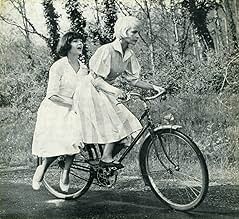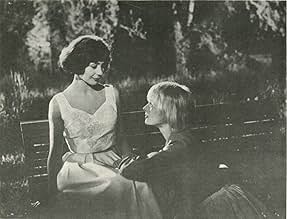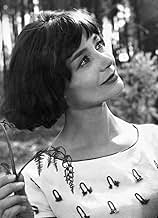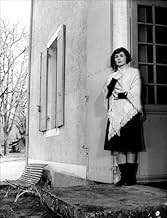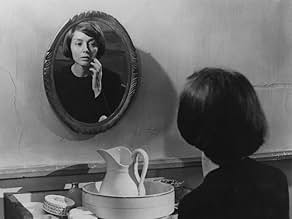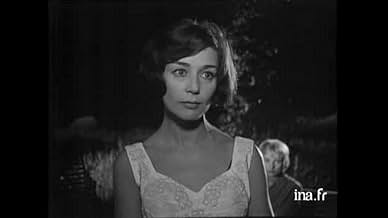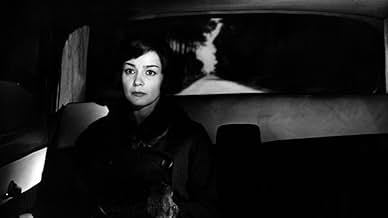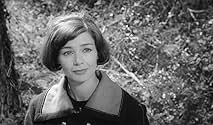Mécontente de son mariage avec un homme ennuyeux qui ne l'aime pas, une femme envisage de se débarrasser de lui en augmentant petit à petit la posologie de ses médicaments.Mécontente de son mariage avec un homme ennuyeux qui ne l'aime pas, une femme envisage de se débarrasser de lui en augmentant petit à petit la posologie de ses médicaments.Mécontente de son mariage avec un homme ennuyeux qui ne l'aime pas, une femme envisage de se débarrasser de lui en augmentant petit à petit la posologie de ses médicaments.
- Récompenses
- 3 victoires et 1 nomination au total
Emmanuelle Riva
- Thérèse Desqueyroux
- (as Emmanuele Riva)
Histoire
Le saviez-vous
- AnecdotesEmmanuele Riva won the Best Actress Award (the Volpi Cup) at the 1962 Venice Film Festival for her performance.
- ConnexionsFeatured in Les échos du cinéma: Épisode #1.41 (1962)
Commentaire à la une
Georges Franju, one of my favorite French directors, is on top form in THÉRÈSE DESQUEYROUX. The psychological buildup in the quiet, slow script, is deceptively simple, but one sees how both Bernard and Thérèse could rate criminals without really intending to be, and for different reasons at that.
Riva deservedly received awards and considerable commendation for her role as the potential killer who knows her husband is taking excessive arsenic medication but fails to warn him. Noiret delivers an equally persuasive performance as the hubby whose main goal in life appears to be to protect his family name. To that end, he makes sure that the court case does not lead to Thérèse's imprisonmnet so that he can render her a prisoner in her own room for a long period, while allowing her to get out to attend mass in his company, thereby giving local society the impression that all is well in the Desqueyroux mansion and family.
It stands to reason from the comments of locals and of the housemaid that society is not fooled - but Thérèse is forced to live in a puppet play with the strings controlled by her unforgiving husband, who determines even how many cigarettes she is allowed to puff away at daily.
Bernard's character runs deeper than one might infer from a single view of this superior film: he is a stickler for complying with duty, with what he is supposed to show society. To that end, he is just about the sole adult male following the priest in an All Saints Day procession, and he religiously goes to mass every Sunday, with the wife who tried to kill him at his side.
There is a brief moment when Bernard seems ready to forgive her and move on. He even uses "tu" instead of the far more distant and impersonal "vous" to address her. But that is quickly over. In the end , each of them enjoys a measure of happiness: she is able freely to stroll about the streets of Paris, he has his business concerns to focus on, even if he regrets having a daughter and not a son, as the Desqueyroux surname is sure to die out.
The B&W photography warrants special praise, giving you a real feel of sunny and rainy days in the country, and giving the film and especially the central character a palpable claustrophobia that impacts on the atmosphere throughout.
Very good script based on the eponymous novel by François Mauriac.
Riva deservedly received awards and considerable commendation for her role as the potential killer who knows her husband is taking excessive arsenic medication but fails to warn him. Noiret delivers an equally persuasive performance as the hubby whose main goal in life appears to be to protect his family name. To that end, he makes sure that the court case does not lead to Thérèse's imprisonmnet so that he can render her a prisoner in her own room for a long period, while allowing her to get out to attend mass in his company, thereby giving local society the impression that all is well in the Desqueyroux mansion and family.
It stands to reason from the comments of locals and of the housemaid that society is not fooled - but Thérèse is forced to live in a puppet play with the strings controlled by her unforgiving husband, who determines even how many cigarettes she is allowed to puff away at daily.
Bernard's character runs deeper than one might infer from a single view of this superior film: he is a stickler for complying with duty, with what he is supposed to show society. To that end, he is just about the sole adult male following the priest in an All Saints Day procession, and he religiously goes to mass every Sunday, with the wife who tried to kill him at his side.
There is a brief moment when Bernard seems ready to forgive her and move on. He even uses "tu" instead of the far more distant and impersonal "vous" to address her. But that is quickly over. In the end , each of them enjoys a measure of happiness: she is able freely to stroll about the streets of Paris, he has his business concerns to focus on, even if he regrets having a daughter and not a son, as the Desqueyroux surname is sure to die out.
The B&W photography warrants special praise, giving you a real feel of sunny and rainy days in the country, and giving the film and especially the central character a palpable claustrophobia that impacts on the atmosphere throughout.
Very good script based on the eponymous novel by François Mauriac.
- adrianovasconcelos
- 31 oct. 2021
- Permalien
Meilleurs choix
Connectez-vous pour évaluer et suivre la liste de favoris afin de recevoir des recommandations personnalisées
- How long is Therese?Alimenté par Alexa
Détails
- Durée1 heure 49 minutes
- Couleur
- Mixage
- Rapport de forme
- 1.66 : 1
Contribuer à cette page
Suggérer une modification ou ajouter du contenu manquant

Lacune principale
By what name was Thérèse Desqueyroux (1962) officially released in Canada in English?
Répondre
